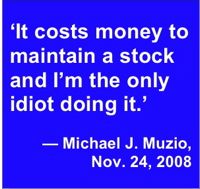Tampa man convicted in scam involving Delray club
By David Sedore, Palm Beach Business.com
DELRAY BEACH — Michael Muzio once complained to his colleagues about how costly it is to run a stock scam. He’s about to find out exactly how expensive it can be when you get caught.
 Muzio faces as much as 190 years in prison after being found guilty Wednesday of securities fraud, wire fraud and conspiracy to commit wire fraud for his part in a con that involved a Palm Beach Gardens financial services company and a Delray Beach investment club. The federal jury also found him guilty of lying to government investigators.
Muzio faces as much as 190 years in prison after being found guilty Wednesday of securities fraud, wire fraud and conspiracy to commit wire fraud for his part in a con that involved a Palm Beach Gardens financial services company and a Delray Beach investment club. The federal jury also found him guilty of lying to government investigators.
Muzio, according to various court records, manipulated the price of International Business Ventures Group by making false public statements about the company, including announcing that he was negotiating a deal to sell electric meters to the Haitian government. He also made a series of “wash” trades — basically shuffling shares of stock back and forth solely to create trading volume and boost the share price of the company.
Problems for Muzio, a Tampa businessman on probation for a grand larceny conviction in New York, began in July 2008 when he met members of a struggling investment club known as HomePals in Delray Beach. HomePals through its offices on Linton Avenue, had raised at least $14.3 million by selling unsecured notes to hundreds of Haitians mostly living in South Florida and New Jersey with the promise of a 100 percent return on their money — every 90 days.
Very little of the money that HomePals raised went to investments; the bulk of it, in Ponzi scheme fashion, went to pay off early investors, leaving the scamsters deeply in a hole and struggling to find a way out. At one point, HomePals had $400,000 in the bank and $14 million in obligations.
Muzio suggested that HomePals buy a publicly traded shell company — a company without any assets or business — and merge itself with into the club. HomePals could repay the noteholders by giving them restricted stock — shares that can’t be traded publicly — instead of cash.
Muzio convinced the club members that with his help HomePals could make millions of dollars and solve all of its problems.
In August, HomePals and Muzio bought International Business Ventures Group, a Palm Beach Gardens company with no operations and little in the way of assets for $265,000. The success of the scheme hinged on jacking up the share price of the shell company — not easy to do through conventional means since the company had no business operations.
What to do? What to do? Muzio solution was to tout International Business as a financial and consumer services company and issue a series of press releases about business deals that the company supposedly had executed.
In one release, he stated that International Business had bought the rights to a type of prepaid electric meter in Haiti and was negotiating a deal to distribute 7.9 million of the devices through the Haitian government.
In another, Muzio said that International Business had a deal to provide pre-paid Mastercards to 8,000 HomePals members.
There wasn’t a shred of truth in either release.
To further pump up the stock, Muzio needed to get an independent stock analyst to recommend that investors buy International Business shares. Of course few if any legitimate analysts are going to touch a stock that had no real business. Muzio solved that problem by having a stock research firm owned by a close friend of his publish a glowing report on the company’s prospects.
To add more weight to the “recommendation,” Muzio arranged for another analyst report done by another supposedly independent firm that gave International Business a “strong buy” rating.
The third leg of the scam involved trading volume. HomePals agreed to pay Muzio $25,000 a month to buy and sell International Business shares in a series of trades intended to show that there was market interest in the stock and to drive up its price.
Muzio began conducting a series of trades through brokerage accounts he controlled, buying and selling thousands of International Business shares at the same price. On some days, his trades were the only ones involving International Business shares.
But Muzio complained that he wasn’t getting any financial support for his scam. "It costs money to maintain a stock and I am the only idiot doing it," he said in an email that investigators obtained.
Eventually SEC investigators began having suspicions about the stock, and on March 6, 2009, the agency suspended trading in the stock.
Muzio is to be sentenced April 29 in federal court. He faces as much as 20 years each on the fraud charges and five years each for two counts of lying to the SEC and FBI.



